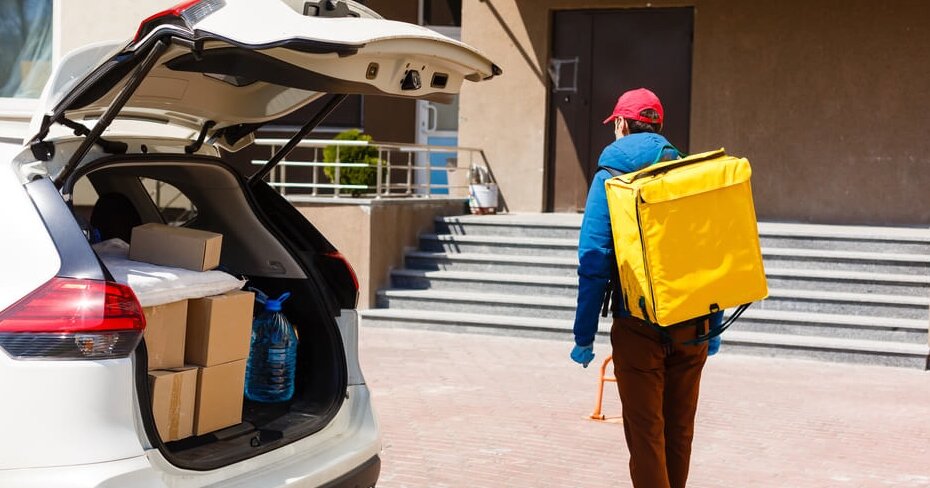Not all food delivery apps offer car insurance. What are your options?
By: Alexandra Bosanac on May 24, 2024
(This article has been updated from a previous version.)
During the pandemic, demand for meal delivery services surged among quarantining Canadians. In turn, people who had found themselves unemployed due to COVID-19 turned to food delivery apps for extra income.
Many of these drivers, however, unknowingly put themselves at risk because they lacked adequate car insurance.
Personal car insurance policies may not cover you if you get into an accident while delivering food. This is because driving for a meal app is considered a commercial activity, which requires a commercial car insurance policy.
Insurance endorsements that protect drivers for meal delivery (in the form of optional coverages that you can add to your personal policy) aren’t widely available in Canada.
Instead, your car insurance company might agree to cover you, but it’s up to their discretion and is decided on a case-to-case basis.
The consequences of not being properly insured can be financially devastating, dealing another blow to drivers who turn to these apps because they’re already in precarious situations.
Related: Auto insurance in Canada for newcomers: A guide
The trouble with meal delivery insurance
Most types of delivery services fall into the realm of commercial insurance, says Elektra Hilton, manager of audit and underwriting at HUB SmartCoverage, an area that personal auto insurance providers “don’t even want to touch.”
When you’re driving for personal use, it’s common to have casual passengers riding with you, and insurance companies are prepared to insure the risks that this presents.
Chauffeuring pizzas or people for Uber rides, however, is a different story — at least from the industry’s point of view.
Related: Do different types of collisions impact your car insurance rates?
How to avoid policy cancellation
Car insurance companies can outright cancel your personal policy if you file a claim for an accident that was caused while driving for a meal delivery platform.
In some cases, even if the accident does not happen during a delivery, failing to notify your insurer that you use your car for delivery can result in claim denials.
In 2022, a Milton man who occasionally made Skip the Dishes deliveries was crashed into by a stolen car. He was not making deliveries at the time of accident but was still denied his $15,000 insurance claim. According to his insurer, there was a “material change in risk.”
Drivers must inform their insurance companies that they intend to drive for a meal delivery service before signing up to avoid outright cancellation — and that advice applies even if the app provides commercial insurance coverage for their drivers.
Having a cancellation on your insurance record can make it hard to find another insurance company willing to provide coverage to you, and if you do, your premiums will be higher. It takes years for a cancellation to be wiped off your record.
Read next: How much car insurance do you really need?
Steps to replace and cancel your existing policy
If you’re already driving for an app and want to avoid risking cancellation to your auto insurance policy, Hilton advises the following actions:
First, contact your insurance company.
If they won’t cover you, stop driving for the app. If you stop driving for the delivery service altogether, your existing policy will remain in place.
If you want to continue driving for a meal delivery service, look for a new insurance company and verify that they will provide coverage for meal delivery apps.
Purchase a new policy from the new car insurance company.
Only once you’ve purchased a new policy should you cancel your existing personal policy.
If you’re thinking about joining a meal delivery app, contact your insurance company before you sign up and complete any trips. Not notifying your insurance company could land you in big trouble.
Where do I find meal delivery insurance?
In addition to your personal car insurance policy, you’ll also need commercial insurance – thankfully, most popular services have their own insurance coverage for drivers.
Economical Insurance created a commercial insurance endorsement in partnership with Uber. Coverage is only available to UberEats drivers, and it covers them while they’re logged into the app and are in the process of making a delivery.
The coverage pays up to $2 million in benefits for property damage and bodily injuries sustained by a third party (i.e., the person you hit), a $2,500 deductible for contingent comprehensive and collision coverage, and up to $2 million for uninsured motorist coverage.
DoorDash also offers Canadian drivers excess third-party liability insurance of up to $1 million in coverage. But this is excess insurance, meaning DoorDash drivers still need to file a claim through their personal auto insurance company first. This means drivers need to maintain their personal auto insurance policy.
Like with UberEats, in order for coverage to kick in, the accident has to happen while you’re on active delivery and are in possession of the food to be delivered.
DoorDash puts it this way: “If you fail to maintain your own insurance, DoorDash's coverage may not apply. Damages sustained to your vehicle in an auto accident are your responsibility and should be addressed by your auto insurance carrier directly.”
The extended insurance coverage offered by Uber and Doordash also apply to people who use e-bikes and e-scooters to make deliveries.
SkipTheDishes, another popular service, considers drivers to be independent contracted couriers and places full responsibility on them for any damages incurred.
According to the site, the requirements to be a Skip courier are “a reliable vehicle, a valid driver’s license vehicle insurance, vehicle registration, and a background check.”
Insurance companies like Aviva and BrokerLink provide tailored insurance coverage for drivers who offer ride-sharing and food delivery. In Ontario, insurance companies aren't obligated to offer specialty coverages, which means food delivery endorsements may be hard to come by.
Save 23% on average on car insurance
Compare 50+ quotes from Canadian providers in 3 minutes.

.jpg?itok=88nBkwga)
.jpg?itok=W5fSKczJ)